Children need to be aware of the dangers out there; and they need to know what to do in case of an emergency. To help keep them safe, come up with (create is perhaps a better word) an unusual code word. Something that no one can figure out (examples you shouldn’t use are the name of their pet dog or their grandmother’s last name). For best results, create a name using several different things--for example: crayons and pens could be made into a code word of “craypen”.
Now, te ach this code word to your children and practice it with them every day before they leave the house. When anyone approaches them, that person (and this is the tricky part) must have the code word or the child is not to go with them. Even if that person is a close friend or a relative, if they do not have the code word, then the child is not to go with them. This means that you will have to make sure family and friends know that they cannot pick up your child without this code word; AND you will not tell anyone, not even family, what this code word is unless they have to pick up your child. Once a code word is used, change it immediately. This code word is the best way to teach your children to stay safe. How many children have been taken and raped and/or killed by people they knew and trusted? This code word, known only to you and your children, will help to keep them safe.
ach this code word to your children and practice it with them every day before they leave the house. When anyone approaches them, that person (and this is the tricky part) must have the code word or the child is not to go with them. Even if that person is a close friend or a relative, if they do not have the code word, then the child is not to go with them. This means that you will have to make sure family and friends know that they cannot pick up your child without this code word; AND you will not tell anyone, not even family, what this code word is unless they have to pick up your child. Once a code word is used, change it immediately. This code word is the best way to teach your children to stay safe. How many children have been taken and raped and/or killed by people they knew and trusted? This code word, known only to you and your children, will help to keep them safe.
Next, teach your children that if the code word is not used (no matter who is trying to get them) they should not go and if the person insists, then the child is to VERY LOUDLY refuse. If that doesn’t work, then they are to cry out for help loudly and continuously until the person leaves and/or help arrives. The same goes for anyone who might try to grab them unexpectedly; the child is to scream for help loudly and continuously. This is the one time the child is allowed to get as loud as they want; in fact they are strongly encouraged to do so.
Once these rules have been established, practice with your child so they get used to the process. Have a friend help by approaching and asking them to go with them. Be sure the friend does not have the correct code word and see what the children do. Coach them over and over until it becomes habit.
Remember, make the code word unusual so it can’t be guessed, and make sure only you and your children know what the word is. Practice the word every day before they leave the house so they will remember what it is. And then, when something comes up and you have to have someone else pick up the kids, GIVE the person the code word and make sure they understand that it is imperative that they use it. Finally, remember to change the code word once it has been used.
For information on keeping your child safe outside of the home go to MyChildSafety.Net


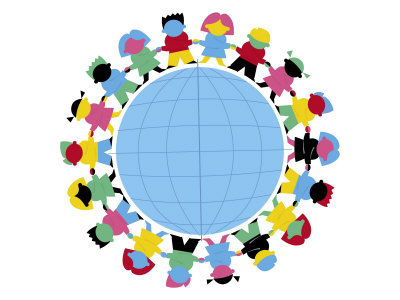
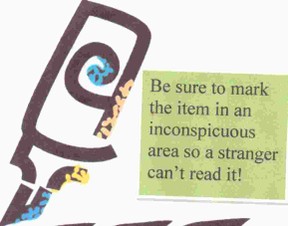 an the outside. Clothes could be marked on the inside tag with a code rather than the child’s name; especially coats, hats, and mittens. Example of a good code is the parent’s initials (or mother’s maiden initials) and the child’s age.
an the outside. Clothes could be marked on the inside tag with a code rather than the child’s name; especially coats, hats, and mittens. Example of a good code is the parent’s initials (or mother’s maiden initials) and the child’s age.  ach this code word to your children and practice it with them every day before they leave the house. When anyone approaches them, that person (and this is the tricky part) must have the code word or the child is not to go with them. Even if that person is a close friend or a relative, if they do not have the code word, then the child is not to go with them. This means that you will have to make sure family and friends know that they cannot pick up your child without this code word; AND you will not tell anyone, not even family, what this code word is unless they have to pick up your child. Once a code word is used, change it immediately. This code word is the best way to teach your children to stay safe. How many children have been taken and raped and/or killed by people they knew and trusted? This code word, known only to you and your children, will help to keep them safe.
ach this code word to your children and practice it with them every day before they leave the house. When anyone approaches them, that person (and this is the tricky part) must have the code word or the child is not to go with them. Even if that person is a close friend or a relative, if they do not have the code word, then the child is not to go with them. This means that you will have to make sure family and friends know that they cannot pick up your child without this code word; AND you will not tell anyone, not even family, what this code word is unless they have to pick up your child. Once a code word is used, change it immediately. This code word is the best way to teach your children to stay safe. How many children have been taken and raped and/or killed by people they knew and trusted? This code word, known only to you and your children, will help to keep them safe.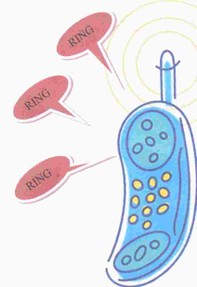 When the phone rings, if you let the children answer it for you, have them answer professionally with the family name and the word ‘residence’ and a polite request for the reason they called such as “Jones Residence, how can I help you?” Make sure that the children NEVER tell a caller that they are alone. If they are alone, they should state that their parent is in the shower and can’t come to the phone right now, or they should say their parent is busy but they can take a message. By not telling anyone that they are alone, they reduce the risk that a predator is calling for that very reason.
When the phone rings, if you let the children answer it for you, have them answer professionally with the family name and the word ‘residence’ and a polite request for the reason they called such as “Jones Residence, how can I help you?” Make sure that the children NEVER tell a caller that they are alone. If they are alone, they should state that their parent is in the shower and can’t come to the phone right now, or they should say their parent is busy but they can take a message. By not telling anyone that they are alone, they reduce the risk that a predator is calling for that very reason. ying football all season and you need to know when to drop off and pick up them and their gear). They shouldn’t be calling buddies and flaunting the receipt of the phone. They also shouldn’t be calling numbers at random (for example they see an ad for a new gadget on the TV and it gives an 800 number to call, your child SHOULD NOT be calling that number). Teach your children how to use the phone correctly and use a prepaid phone so their calling abilities are limited.
ying football all season and you need to know when to drop off and pick up them and their gear). They shouldn’t be calling buddies and flaunting the receipt of the phone. They also shouldn’t be calling numbers at random (for example they see an ad for a new gadget on the TV and it gives an 800 number to call, your child SHOULD NOT be calling that number). Teach your children how to use the phone correctly and use a prepaid phone so their calling abilities are limited.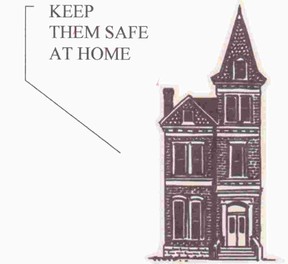 Ensure that the door to the house is locked at all times. If someone knocks, the young child should never answer it (try keeping a dead bolt that is too high for the little ones to reach). Older children should ask who it is or use the peep hole (a peep hole is best because then they can see for themselves who it is). Children should never open a door for someone they do not know and only for those they do know when you are standing there. This ensures that they aren’t grabbed before you can reach the door to protect them.
Ensure that the door to the house is locked at all times. If someone knocks, the young child should never answer it (try keeping a dead bolt that is too high for the little ones to reach). Older children should ask who it is or use the peep hole (a peep hole is best because then they can see for themselves who it is). Children should never open a door for someone they do not know and only for those they do know when you are standing there. This ensures that they aren’t grabbed before you can reach the door to protect them. 
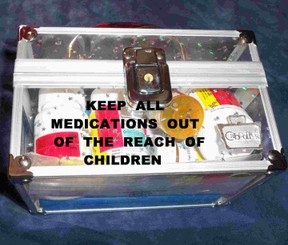 Young teens and even younger children are experimenting and trying out their parents drugs without them even being aware of it. They often talk about the different medications and such that are kept in the house with friends. So how can we protect these things without building a vault? We can easily protect these things by following two basic rules. One, keep prescription medications locked in a lock box of some type. Two, keep all medications and supplements where you can see and reach them but the children cannot. That means they could be in your closet on a high shelf, or they could be in the kitchen on the top of the cabinets. Take them down once a week and fill a pill dispenser with what you need to take for the week and secure the rest. Keep the dispenser in a secure place like your purse, briefcase, or bed table. Check them when you take them to make sure things aren’t missing. This reduces the amount that the children may have access to and helps you keep track of what is there. Also, don’t teach the children how to call in a refill for your prescription and never have them pick one up for you (unless they are a trusted adult, of course).
Young teens and even younger children are experimenting and trying out their parents drugs without them even being aware of it. They often talk about the different medications and such that are kept in the house with friends. So how can we protect these things without building a vault? We can easily protect these things by following two basic rules. One, keep prescription medications locked in a lock box of some type. Two, keep all medications and supplements where you can see and reach them but the children cannot. That means they could be in your closet on a high shelf, or they could be in the kitchen on the top of the cabinets. Take them down once a week and fill a pill dispenser with what you need to take for the week and secure the rest. Keep the dispenser in a secure place like your purse, briefcase, or bed table. Check them when you take them to make sure things aren’t missing. This reduces the amount that the children may have access to and helps you keep track of what is there. Also, don’t teach the children how to call in a refill for your prescription and never have them pick one up for you (unless they are a trusted adult, of course). 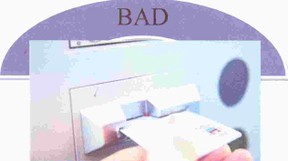 ver uses the card unless you have specifically instructed them to do so, for instance they may have to use it to buy school lunch, but they shouldn’t be going to an ATM after school with all their friends to show them how easy it is for them to get money.
ver uses the card unless you have specifically instructed them to do so, for instance they may have to use it to buy school lunch, but they shouldn’t be going to an ATM after school with all their friends to show them how easy it is for them to get money. 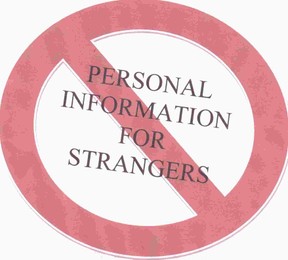 Start early because it is natural for young children to announce their personal information to strangers once they have learned it because they want to show how smart they are. The things that shouldn’t be discussed or told to anyone outside of the immediate family are: phone numbers including all cell phones; address including any PO Box numbers; house location (we’re the first green house on the block); type of car the family has; layout of the house itself (my bedroom is in the back where all the trees grow really big); whether mom and dad both work and when they work; whether they are going to be alone for any length of time; what type of pets they have along with their numbers and their names; any passwords or code words they have been taught; where things are located (my daddy keeps all his twenty hundred guns in the garage right behind where he parks the car, you should see them all.); expensive items such as diamond rings; their full name (my name is Jessie Jonathon Jenkins the third and I’m named after my daddy); even simple things like where their grandparents live. It sounds strange to keep your children from talking about these things, but if they tell a friend and a non-friend is listening…..I don’t think I have to explain the rest.
Start early because it is natural for young children to announce their personal information to strangers once they have learned it because they want to show how smart they are. The things that shouldn’t be discussed or told to anyone outside of the immediate family are: phone numbers including all cell phones; address including any PO Box numbers; house location (we’re the first green house on the block); type of car the family has; layout of the house itself (my bedroom is in the back where all the trees grow really big); whether mom and dad both work and when they work; whether they are going to be alone for any length of time; what type of pets they have along with their numbers and their names; any passwords or code words they have been taught; where things are located (my daddy keeps all his twenty hundred guns in the garage right behind where he parks the car, you should see them all.); expensive items such as diamond rings; their full name (my name is Jessie Jonathon Jenkins the third and I’m named after my daddy); even simple things like where their grandparents live. It sounds strange to keep your children from talking about these things, but if they tell a friend and a non-friend is listening…..I don’t think I have to explain the rest. without you present and they should never just reach out to the animal. Always make sure the owner gives permission and then have the child offer their hand for the animal to smell. If the animal backs away or growls, they should remove their hand and not try to touch the animal. Animals also carry many diseases especially if they are outside animals. I know how heart-rending it is to see a cute little baby kitty sitting in the rain, but your child should never approach them especially when they are alone. If it bothers them, and it probably will, then they should tell a trusted adult about it.
without you present and they should never just reach out to the animal. Always make sure the owner gives permission and then have the child offer their hand for the animal to smell. If the animal backs away or growls, they should remove their hand and not try to touch the animal. Animals also carry many diseases especially if they are outside animals. I know how heart-rending it is to see a cute little baby kitty sitting in the rain, but your child should never approach them especially when they are alone. If it bothers them, and it probably will, then they should tell a trusted adult about it.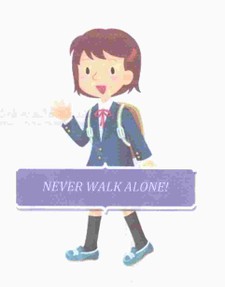 n aren’t close to the road, this trick is difficult at best and impossible at most. Also, have children who need to walk on the road to stay in groups and as close to the side as possible. If a car comes, they should be aware of it because often the predator is counting on surprise when they try to take a child this way. Also, teach them the rules of traffic. When walking down the road, they should be facing on-coming traffic as they walk. This means that when the traffic is on the right heading north, then the child should be on the right heading south. That way they can see cars approaching them.
n aren’t close to the road, this trick is difficult at best and impossible at most. Also, have children who need to walk on the road to stay in groups and as close to the side as possible. If a car comes, they should be aware of it because often the predator is counting on surprise when they try to take a child this way. Also, teach them the rules of traffic. When walking down the road, they should be facing on-coming traffic as they walk. This means that when the traffic is on the right heading north, then the child should be on the right heading south. That way they can see cars approaching them. 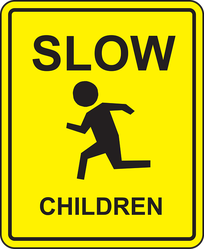

 Fruit and vegetable juice or whole fruits and vegetables, which is better for youon 04/23/2013
Fruit and vegetable juice or whole fruits and vegetables, which is better for youon 04/23/2013
 How to use memory wire to create jewelryon 12/19/2012
How to use memory wire to create jewelryon 12/19/2012
 The Spriteon 11/27/2012
The Spriteon 11/27/2012
 How to keep your feline companions safe and content during the holiday seasonon 11/10/2012
How to keep your feline companions safe and content during the holiday seasonon 11/10/2012
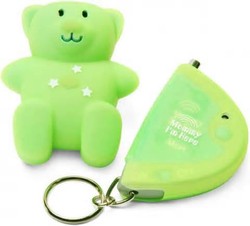
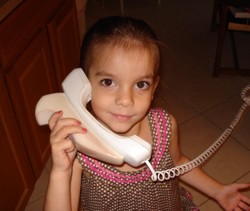
Do you know of any child safety links? Feel free to add them here for all to see as well as any comments you may have.
You are right, we do, but if we show them we are following the practices as well, they are often more inclined to pay attention. thanks for the great comments.
Cheryl, This is an excellent article. I am planning a similar one after visiting my grandchildren recently and seeing some safety issues I'm concerned about. Kids are very trusting by nature. Unfortunately, we have to instill fear in them.
I got your message and appreciate you getting the info to me so fast. How right you are that the safety message needs to come from more than just us. Thank you so much for the help.
I know of this really great safety cd I used for my kids. It's really important you provide them with safety messages from someone or source other than you. Reinforcement! I'll send you a message about it. :)K
katiem2, thanks for the tweet, I appreciate it. The more kids we can keep safe, the better.
Very helpful tips on keeping our children safe from predators. I'm tweeting this now. Thanks :)K
My kids are afraid because they need to be, however, I have used these techniques in some of the most dangerous areas that we lived in and my children remainded safe. You don't have to use them all, just the ones you need. And, I fear, building fear in your children may be the only way to keep them safe in such a dangerous society. I agree it may be too much, I was just trying to ensure I covered all the bases. Thank you for stopping by and adding your thoughts.
Is there not enough fear in the world already? My goodness, I know you think you are helping people be safe but really you are just feeding the fear. How do you do all this without feeding fear to your kids?